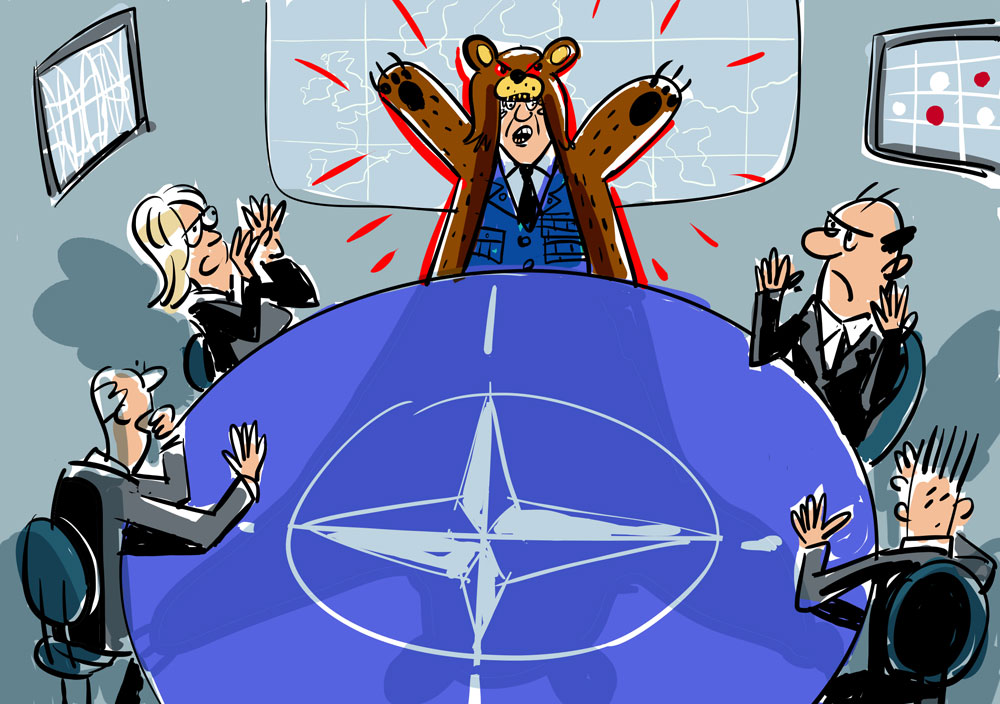
Drawing by Iorsh
Two high-ranking U.S. generals made statements earlier this month about the need “to deter Moscow” and build up military potential to that end. One of those generals represented not just the United States but also NATO.
The statements, made by Generals Joseph F. Dunford and Curtis Scaparrotti are part of a battle of nerves around a revision of the Russia-NATO Founding Act, which both sides signed in 1997, laying out the rules of interaction between Russia and NATO in Eastern Europe.
Among the reasons why Moscow agreed to sign the Founding Act was NATO’s alleged promise not to deploy large military contingents and nuclear weapons on the territory of its new East European members. [In fact, former Soviet leader Mikhail Gorbachev admitted in an interview with RIR in 2014 that no such promise was actually made – RIR]. After the conflict in Ukraine and a year before the renewal of the treaty set for 2017, it appears that NATO intends to revise the act.
The indications began with the decision taken at the NATO summit in Wales in September 2014 to deploy additional military contingents in Eastern Europe, in violation of the Founding Act, although the alliance maintains that the deployment is being done is not on a permanent but on a rotational basis. The Founding Act bans NATO from setting up permanent military bases near Russian territory.
Poland, a NATO member state, has already declared that the Founding Act, in its current form, is inadequate. The question arises: what document will replace it? Russia would like to sign a new agreement that stipulates demilitarization of the territory of NATO’s East European members.
Realizing that the alliance will not agree to this, Moscow has since April 2015 been proposing another option: signing an agreement that would guarantee the neutral status of and absence of troop formations on the territory of four states bordering Russia: Finland, Ukraine, Moldova [Moldova does not actually border Russia – RIR] and Georgia. There have been precedents of “imposed neutrality” in international law, e.g. the four-party agreement of the Allied occupying powers on Austria in 1955. NATO, it appears, is opposed to this, too.
Both sides are testing each other’s nerves: Who will force whom to sign a new document? In this situation, several scenarios are possible. In the event of hostilities like those that took place in South Ossetia in 2008, they may end up with no agreements at all.
The second option is if both sides agree on demilitarization of the Baltic and Black Sea region. Yet this is likely to be merely notional. For instance, the Americans may declare that they have no intention of accepting those four countries in NATO, but the intention may arise in future. Then those countries will be granted the status of Major non-NATO Ally. In that case, the U.S. would in effect get its own way.
The third scenario is that both sides manage to agree on a document banning the deployment of large military contingents in that region. This document could be a revival of the half-forgotten Vienna Document on Confidence and Security Building Measures in Europe that became part of the 1975 Helsinki Act. Unless events follow the first scenario, both sides are in for a tough war of nerves and efforts to work out a new document by May 2017.
Regarding Gen. Dunford’s statement that, to contain Russia, the U.S. needs new weapons, including in outer space and cyberspace, it is clear that these are long-term projects. This is not a matter of the next three years, but of 10-15 years from now, in the best-case scenario.
This is yet another manifestation of the same battle of nerves: It’s hard to interpret this as an arms race. It’s not as if there is a large-scale use of defence industry capacities or deployment of new types of weapons. Furthermore, the current level of science and technology simply does not make it possible to create these types of weapons, although the task to develop them was set out in the National Space Policy of President George Bush Jr. in 2006.
The Founding Act will turn 20 years old in 2017. Russia and NATO need to renew it by arriving at a new agreement.
Alexei Fenenko is assistant professor in the Department of World Politics at Moscow State University.
The opinion of the writer may not necessarily reflect the position of RIR or its staff.
All rights reserved by Rossiyskaya Gazeta.
Subscribe
to our newsletter!
Get the week's best stories straight to your inbox